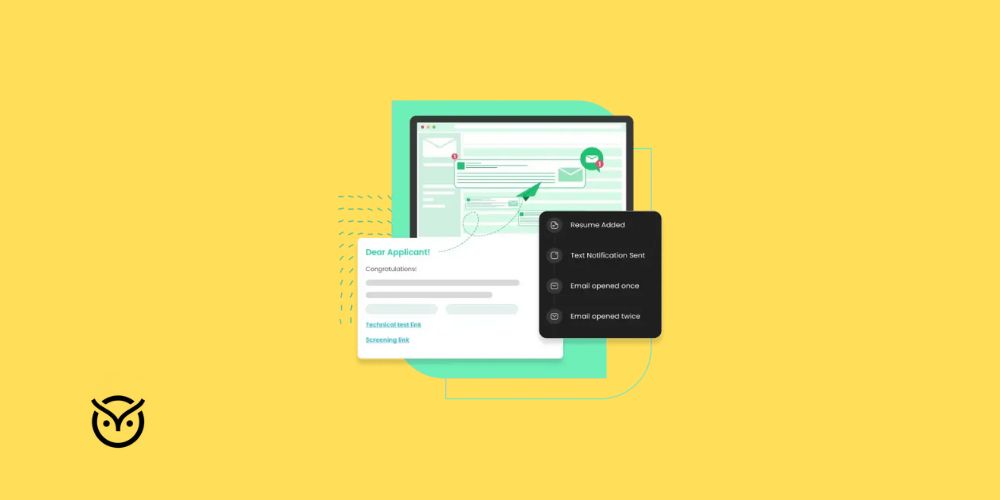
TL;DR
- Screening interview questions check if you meet basic role requirements.
- Expect HR, role-specific, and culture-fit queries.
- Prepare answers and questions to ask during a screening interview.
- Usually 20–30 minutes by phone or video.
- Preparation boosts your chances of moving forward.
You’ve applied for a job, hit “submit” and now your phone rings. It’s HR inviting you for a screening interview, and suddenly, you’re wondering, what does that even mean, and what do they ask? Many candidates underestimate this step, thinking it’s just a formality. In reality, screening interview questions are designed to decide whether you move forward or get cut from the hiring process before it even begins.
The good news? This early stage is about alignment. Recruiters use pre-screening interview questions and answers to confirm your qualifications, clarify expectations, and assess fit. Suppose you prepare well, by knowing the common screening interview questions, understanding the pre-screening process in recruitment, and having thoughtful questions to ask in a screening interview. In that case, you can turn this quick call into your ticket to the next round. And that’s exactly what we’ll help you do in this blog.
What Is a Screening Interview?

A screening interview is the first formal step in the hiring process, designed to quickly determine if a candidate is worth moving forward to the next stage. It’s basically a pre-screening interview where recruiters or HR professionals check whether your qualifications, experience, and salary expectations match the role. This is a structured part of the pre-screening process in recruitment.
A screening interview definition can be explained as a short, focused discussion, usually over the phone, on video, or sometimes in person, meant to assess whether a candidate meets the essential criteria before proceeding to a full interview.
Key Features of a Screening Interview
Format
Often via phone, video call, or occasionally in-person for local candidates.
Duration
Typically 20–30 minutes, though some roles may require longer conversations.
Interviewer
Usually conducted by a recruiter, HR coordinator, or talent acquisition specialist.
Goal
Confirm eligibility, interest, and availability while evaluating initial culture fit.
This step may also involve a pre-screen questionnaire, especially in high-volume recruitment, where candidates answer standard job screening questions before speaking to a human.
Real or Myth? – Screening Interview Edition
Screening interviews are just quick chats that don’t really matter.
❌ Myth! Even though they’re short, they can make or break your chance to move forward.
You can’t fail a screening interview—it’s just a formality.
❌ False. Many candidates are filtered out at this stage if they’re unprepared or misaligned.
Screening interviews are only for entry-level jobs.
❌ Nope. They’re used across all levels—from interns to executive hires—to save time upfront.
You should always ask your own questions during a screening interview.
✅ Real! Asking thoughtful questions shows interest and helps you assess fit early on.
Common Screening Interview Questions Recruiters Ask

Let’s say you walk into a screening interview, the recruiter’s main objective is to decide whether you’re a potential match worth moving forward. While every company tailors its approach, there are several common screening interview questions you’re likely to encounter.
General HR-Focused Questions
These are the HR screening interview questions designed to confirm your employment eligibility, work preferences, and basic qualifications:
- “Can you walk me through your resume?”
- “Why are you interested in this role and our company?”
- “What are your salary expectations?”
- “Are you legally authorized to work in this country?”
- “What’s your availability to start?”
Many organizations use these questions you’re asked in a screening interview to filter out candidates who don’t meet location, salary, or start-date requirements.
Tip for Candidates: If salary comes up, keep your answer flexible unless you’re sure of your worth based on market data.
Role-Specific Questions
In addition to general HR queries, recruiters often use screening questions for interviews that check your technical or role-specific knowledge:
- For a marketing role: “Can you share an example of a campaign you managed from start to finish?”
- For a developer role: “Which programming languages do you work with most confidently?”
- For a sales role: “How do you approach lead qualification and closing deals?”
These initial interview screening questions help the recruiter gauge whether you have the foundational skills before arranging a deeper technical interview.
Cultural Fit Questions
Hiring managers sometimes mix in questions that help them see whether your personality and approach match the company’s culture and daily workflow. Examples include:
- “What kind of work environment helps you do your best?”
- “How do you usually like to get feedback from a manager?”
- “What drives you to excel in your role?”
These kinds of HR interview screening questions help employers judge whether you’re likely to thrive in the long run.
Company-Specific or Meta Questions
Some companies include what could be called meta screening interview questions. These focus on your understanding of the hiring process itself:
- “Have you applied to other roles with our company before?”
- “Are you currently interviewing elsewhere?”
- “What do you expect from our recruitment process?”
These help recruiters gauge your engagement level and competition for your attention.
Behavioral Pre-Screen Questions
Behavioral questions are common in preliminary screening interview questions to get a sense of how you approach work situations:
- “Tell me about a time you handled a challenging project under pressure.”
- “Give an example of when you had to quickly learn a new skill.”
- “Can you share an example of a time when you worked with a colleague who was challenging to collaborate with?”
These pre-interview screening questions may seem small, but they give recruiters insight into your problem-solving style and interpersonal skills early in the process.
Guess the Intent – Why Do Recruiters Ask This?
1. What are your salary expectations?
See the correct answer
Salary alignment – the recruiter wants to know if expectations match the budget.
2. Why are you interested in this role?
See the correct answer
Motivation check – this helps them assess if you’re genuinely interested in the position or just applying randomly.
3. Can you walk me through your resume?
See the correct answer
Experience verification – they want to confirm that your background matches what’s required for the role.
4. Are you legally authorized to work in this country?
See the correct answer
Work eligibility – recruiters must ensure candidates can legally work before progressing further.
Screening Interview Questions by Role Type

Not all screening interview questions are one-size-fits-all. Recruiters often tailor their pre-screening interview questions and answers based on the job’s requirements. Below are examples of initial interview screening questions broken down by common job categories.
Which Role Are You? – See Your Screening Questions
Choose your role below to view examples of pre screening interview questions and answers tailored to that type of position.
👨💻 Developer
- Which programming languages are you most confident working with?
- Have you built any applications using [specific tech stack]?
- How do you manage version control in team environments?
- Are you familiar with Agile or Scrum methodologies?
📣 Marketing Manager
- Can you walk me through a recent campaign you managed?
- What tools do you use for tracking performance metrics?
- How do you approach branding versus conversion goals?
- Have you worked with cross-functional teams like product or sales?
💼 Sales Executive
- What’s your average deal size and close rate?
- How do you qualify leads before a sales pitch?
- Which CRM systems are you familiar with?
- What’s your approach to handling objections?
🧑💼 HR Specialist
- What HRIS platforms or payroll tools have you used?
- How do you handle confidential employee issues?
- Have you been involved in managing performance review cycles?
- What’s your approach to promoting employee engagement?
These pre-interview screening questions help recruiters determine whether your approach is proactive, detail-oriented, and people-friendly.
Questions Candidates Can Ask During Screening

The screening interview is your opportunity to learn if the role, team, and culture are the right fit. Knowing the questions to ask during a screening interview shows initiative, curiosity, and professionalism.
Role & Expectations
“How would you define success for this position in the first three months?”
This signals you’re thinking about results, not just responsibilities.
“What are the top challenges someone in this role would face?”
It uncovers potential pain points early, especially if they weren’t in the job listing.
Hiring Process & Timeline
“How many interview rounds should I expect?”
Helps you mentally prepare and gauge the length of the process.
“When are you looking to make a hiring decision?”
Clarifies the timeline and keeps you from waiting in limbo.
Culture & Team
“What is the team structure like?”
This is essential in understanding how collaborative (or siloed) the role may be.
“Can you share about the company’s approach to work-life balance or flexibility?”
Relevant especially in a post-COVID remote/hybrid world, plus it addresses values.
Company Direction
“What are the company’s current priorities or goals for this year?”
You’ll appear engaged with the company’s growth, not just your paycheck.
“What has changed in the company or team recently that led to hiring for this position?”
This could reveal whether the job is new (a good sign of growth) or a backfill (worth understanding why someone left).
Would You Ask This? – Candidate Questions to Consider
Here are a few potential questions to ask in a screening interview. Click to see if they’re smart or risky to bring up early in the process.
🟠 “What are the biggest challenges your team is facing right now?”
✅ Smart Question – It shows you’re thinking ahead about the role’s real-world impact and how you could contribute.
🟠 “Will I be promoted within 6 months?”
❌ Better Not – This might come across as impatient. Focus on growth paths, not specific timelines.
🟠 “Can you describe the company culture in a few words?”
✅ Smart Question – It’s thoughtful, open-ended, and helps you assess cultural fit early.
🟠 “Do you monitor employees’ online activity?”
⚠️ Use with Caution – While privacy is important, this might come off as distrustful in a first-round chat. Consider rephrasing.
How to Prepare for a Screening Interview

A successful screening call is often your golden ticket to the next round. Here’s how to approach it so you’re confident, clear, and ready for any screening interview questions.
Understand the Pre-Screening Process in Recruitment
Before anything else, know that the pre-screening interview is about efficiency. Recruiters are looking to verify the basics: qualifications, experience, salary expectations, and availability. A pre-screen questionnaire or initial phone call helps them filter large applicant pools quickly.
Review the Job Posting and Your Resume Side-by-Side
Highlight the overlap between your skills and the requirements listed. If the job calls for “experience with Salesforce” and you’ve used it extensively, prepare a quick, clear example to share.
This is critical because questions you’re asked in a screening interview often start with, “Can you walk me through your experience related to [specific requirement]?”
Prepare for Common Screening Interview Questions
Expect a mix of HR screening interview questions, role-specific queries, and behavioral prompts. Have answers ready for things like why you’re interested in this role, your most relevant skills, salary expectations and availability.
Tip: Practice giving concise answers, 20–40 seconds per question, so you don’t ramble.
Research the Company and Industry
Knowing the basics of the company shows genuine interest. Recruiters remember candidates who reference recent news or industry trends.
Example: “I noticed your company just expanded into the APAC market. How does this role contribute to that growth?”
Prepare Questions to Ask in a Screening Interview
Have at least 3–5 questions ready (see Section 6 above). These demonstrate interest and help you evaluate fit.
Test Your Tech for Virtual Screenings
If the initial interview screening questions are asked via video call, make sure your connection, camera, and mic are working. Poor tech readiness can make you seem unprepared.
Mind Your Tone and Pace
Recruiters aren’t just evaluating your answers. They’re gauging professionalism, energy, and communication style. If you don’t want to look nervous, don’t speak fast; too slow, and you risk losing engagement.
Follow Up After the Call
Always send a short thank-you email. Research from TopResume found that 68% of hiring managers notice when candidates send thank-you notes, and it positively impacts impressions.
Screening Interview Red Flags (For Recruiters & Candidates)

A screening interview is a two-way street. Both sides should watch for warning signs that the fit may not be right.
Red Flags for Recruiters
Candidate Lacks Preparation
If the candidate can’t answer basic pre-interview screening questions like “Why are you interested in this role?” it may indicate a lack of genuine interest.
Inconsistent or Vague Work History
When answers don’t align with the resume or key experiences are missing, this can signal exaggeration or dishonesty.
Unrealistic Salary Demands
If expectations are far above market rate without a clear justification, it could be a mismatch.
Lack of Availability
If a candidate can’t start within a reasonable timeline for the role’s urgency, it might stall the process.
Red Flags for Candidates
Job Description vs. Actual Role Misalignment
If the recruiter’s description of duties doesn’t match the posting, that’s a potential bait-and-switch.
Vague or Avoided Answers About Culture or Benefits
When direct questions to ask during a screening interview, such as “What’s the team culture like?”, are brushed aside, it could be a sign of deeper issues.
High Turnover in the Role
If the recruiter admits the position has been refilled multiple times recently, it’s worth asking why.
Overly Rushed Process
Efficiency is good. But having a hiring process that skips proper interviews in favor of quick offers can sometimes point to instability or high churn.
Spot the Red Flag – Interactive Quiz
Conclusion
A screening interview may seem like a quick checkpoint, but it’s one of the most decisive moments in the hiring process. By preparing for common screening interview questions, having your own questions to ask in a screening interview, and recognizing red flags, you can make this step work for you and not against you. Treat it as both your introduction and your filter, ensuring that the role aligns with your skills, goals, and values before you invest further time in the process.
FAQs – Screening Interview Edition
How long does a screening interview last?
Most preliminary screening interview questions are covered in 20–30 minutes, though some can be shorter or extend to 45 minutes for more complex roles. High-volume hiring often leans toward brief, targeted calls.
Is a screening interview a real interview?
Yes. While it’s often seen as part of the pre-screening process in recruitment, it’s still a formal evaluation. Your performance here directly impacts whether you move forward, so treat HR screening interview questions with the same preparation you would for later stages.
What happens after a screening interview?
If you pass the pre-screening interview, you’ll typically move to the next stage. This could be a hiring manager interview, technical assessment, or panel discussion. Recruiters use the screening interview stage to shortlist candidates before committing further resources.
Can you fail a screening interview?
Absolutely. Giving unclear answers to initial interview screening questions, showing a lack of preparation, or having misaligned expectations on salary, availability, or qualifications can result in rejection at this stage.
Is salary always discussed in screening interviews?
Not always, but it’s common. Many questions you’re asked in a screening interview include salary to ensure alignment early. If it comes up, be honest but flexible, using market data to guide your range rather than locking into a fixed number too soon.




